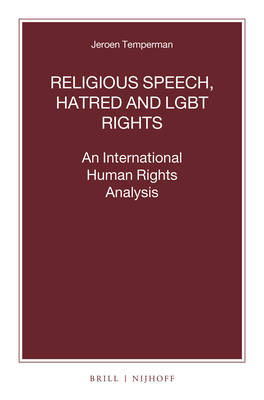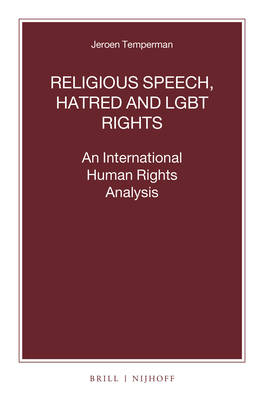
- Afhalen na 1 uur in een winkel met voorraad
- Gratis thuislevering in België vanaf € 30
- Ruim aanbod met 7 miljoen producten
- Afhalen na 1 uur in een winkel met voorraad
- Gratis thuislevering in België vanaf € 30
- Ruim aanbod met 7 miljoen producten
Zoeken
€ 132,95
+ 265 punten
Omschrijving
This book investigates the dynamics between international incitement prohibitions and international standards on freedom of religious speech, with a special focus on the potential incitement prohibitions for the protection of the rights of LGBT+ people. To that end, the book seeks to determine if and to what extent sexual orientation and gender identity are protected grounds under international anti-incitement law. Building on that analysis, the book also delves deeper into the particularly controversial and complex issue of religiously-motivated speech against LGBT+ people, a phenomenon engaging both religious speech rights and equality and other rights of LGBT+ people. Drawing on recent international law benchmarking in the area of incitement and complementing this with extensive comparative legal analysis, best practice lessons are presented on how to calibrate free religious expression and the protection of LGBT rights in the pluralist state. Among other findings, the present research rejects a sweeping a priori trump in the form of a 'scripture defence' against incitement charges, but rather recommends a context-based risk assessment of speech acts potentially affecting the rights of LGBT+ people.
Specificaties
Betrokkenen
- Auteur(s):
- Uitgeverij:
Inhoud
- Aantal bladzijden:
- 116
- Taal:
- Engels
- Reeks:
- Reeksnummer:
- nr. 103
Eigenschappen
- Productcode (EAN):
- 9789004458857
- Verschijningsdatum:
- 24/06/2021
- Uitvoering:
- Paperback
- Formaat:
- Trade paperback (VS)
- Afmetingen:
- 155 mm x 235 mm
- Gewicht:
- 208 g

Alleen bij Standaard Boekhandel
+ 265 punten op je klantenkaart van Standaard Boekhandel
Beoordelingen
We publiceren alleen reviews die voldoen aan de voorwaarden voor reviews. Bekijk onze voorwaarden voor reviews.








